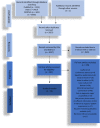Reforming support systems of newly diagnosed brain cancer patients: a systematic review
- PMID: 34826034
- PMCID: PMC8714629
- DOI: 10.1007/s11060-021-03895-4
Reforming support systems of newly diagnosed brain cancer patients: a systematic review
Abstract
Purpose: Despite the increasing incidence of currently incurable brain cancer, limited resources are placed in patients' support systems, with reactive utilisation late in the disease course, when physical and psychological symptoms have peaked. Based on patient-derived data and emphasis on service improvement, this review investigated the structure and efficacy of the support methods of newly diagnosed brain cancer patients in healthcare systems.
Methods: This systematic review was performed following the Preferred Reporting Items for Systematic Reviews and Meta-Analysis Protocols. Articles from PubMed, Embase, and CENTRAL databases were screened with six pre-established eligibility criteria, including assessment within 6 months from diagnosis of a primary malignant brain tumour. Risk of bias was evaluated using the Newcastle-Ottawa Scale and Critical Appraisal Skills Program (CASP) Qualitative Studies Checklist.
Results: Of 5057 original articles, 14 were eligible for qualitative synthesis. Four studies were cross-sectional and ten were descriptive. Information given to patients was evaluated in seven studies, communication with patients in nine, and patient participation in treatment decisions in eight. Risk of bias was low in ten studies, moderate in two, and high in two.
Conclusions: Techniques promoting individualised care increased perceived support, despite poor patient-physician communication and complexity of the healthcare system. Extracted data across 14 included studies informed a set of guidelines and a four-step framework. These can help evaluate and reform healthcare services to better accommodate the supportive needs of this patient group.
Keywords: Diagnosis; Primary malignant brain neoplasms; Primary malignant brain tumours; Psychosocial support systems.
© 2021. The Author(s).
Conflict of interest statement
The authors report no financial or non-financial conflicts of interest.
Figures



References
Publication types
MeSH terms
LinkOut - more resources
Full Text Sources
Medical

